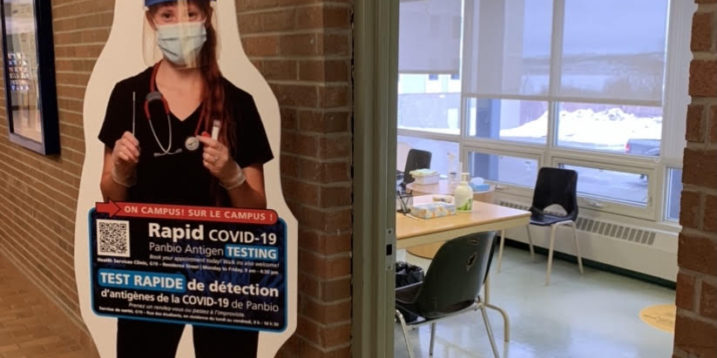by Lexey Burns, Editor-in-Chief
With the rise of COVID-19 cases across the province, Laurentian has introduced a rapid COVID-19 testing center on residence’s student street that has identified one preliminary positive case.
Lyne Rivet, manager of Health and Wellness Services, says that preliminary positives are not confirmed positives but they “have to report it because according to the health protection and promotion act, it’s a reportable disease even though it’s a preliminary positive.”
Rivet confirmed that the one preliminary positive case lives in residence, although did not specify which one.
According to the Ministry of Health and Long Term Care Case definition, a preliminary positive is:
“Positive results issued from point-of-care assays are reportable to public health, but require confirmation… Final case status (Confirmed or Does Not Meet Case Definition) should be based on the parallel confirmatory laboratory-based test result. If no parallel specimen is collected, the case status should remain as probable.”
“We’ve tested approximately 196 at this point in time. We have 1 preliminary positive whom we are awaiting the results [of the gold standard test] from Public Health Ontario,” Rivet said.
Rivet says that the rapid test is 70% sensitive and 95% specific as opposed to the “gold standard” PCR test which is 99.9% effective.
Rivet says that after receiving a preliminary positive, the protocol is to inform Public Health Sudbury and Districts who will do contract tracing.
Laurentian residence did not comment on the issue.
Robert Haché, President of Laurentian University said in an email to students that if a student receives a preliminary positive result, they are to take a “gold standard” PCR COVID-19 test and isolate until the results.
“This option is available to students in order to help protect not only our campus community, but the Greater Sudbury community as a whole,” he said.
“With the spread of the virus happening faster than ever, we are aware that it may simply be a matter of time until we have a positive case on campus, however, we are confident that we have the right protocols in place to limit the spread.”
Accessible to students, they can book an appointment or walk right in to be tested.
Rapid tests
The rapid test, unlike normal COVID-19 tests, only takes fifteen minutes to receive results.
Rivet says that it’s beneficial because students have an option to get tested if they aren’t showing any symptoms.
Symptomatic students are to contact the assessment center or have to make an appointment with the nurse practitioner.
“As we know, this virus is invisible, so some people don’t have any symptoms so it’s an opportunity to break that chain of transmission with early detection and intervention,” Rivet said.
“It’s very successful. We’ve had over thirty people a day… Two people can book per fifteen minutes so we can reduce the waiting periods for individuals,” Rivet said but George Flager, a health promotion student doing an internship at the rapid testing center said that they’d “like to see a bit more of an uptake.”
Rivet said that the program is set to continue in residence for up to 8 weeks.
“It’s funded through the government, so through Health Canada, and then the government does provide the infrastructure, and provides the nursing staff and the technology so all the computer and the PPE [Personal Protective Equipment],” Rivet said.
Guelph and Waterloo also have the same rapid testing services.
Students react to rapid testing on residence
Kassius St. Kitts, a third year Outdoor Adventure Leadership student as well as a residence porter said it’s “better safe than sorry.”
“I got it because I was coming from Mississauga, which definitely isn’t the best place to be right now,” St. Kitts said,
“Even though I was social distancing I still wanted to get it just in case. Plus it’s free so there’s no reason not to.”
Abby Westal is a first year forensics student who is “from out of province.”
She said she had to take a plane to return to Sudbury and “wanted my roommates to feel safe knowing I didn’t have it!”
Patrick Savage and Ryland Jacobs, both third year geology students, just moved into residence in January after spending the fall semester working and taking classes part-time.
“Since I was working around people all the time until I came back up to res, I wanted to make sure I wasn’t putting myself or others at risk,” Jacobs said.
Savage and Jacobs are from COVID-19 hotspots. Savage from Ottawa and Jacobs from Mississauga.
The rapid COVID-19 testing centre in student street is open from 9 am to 4:30 pm. They accept walk-ins and are able to book appointments online.
